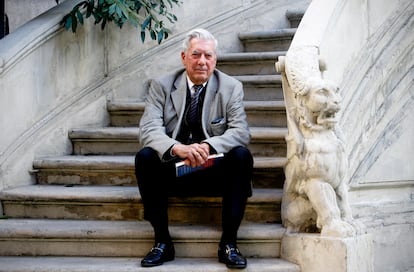Mario Vargas Llosa, a giant of universal literature, dies at 89
The Spanish-Peruvian writer, Nobel Prize winner for Literature in 2010, was the author of masterpieces such as ‘Conversation in the Cathedral’


Peruvian novelist Mario Vargas Llosa died this Sunday in Lima, his children Álvaro, Gonzalo and Morgana announced in a statement. Born in Arequipa on March 28, 1936, the 2010 Nobel Prize winner for Literature had just turned 89. Author of seminal works such as Conversation in the Cathedral, The City and the Dogs, and The Feast of the Goat, he was one of the most important writers of contemporary literature in any language. A novelist, essayist, polemicist, columnist, and academic, Vargas Llosa will go down in history as an extraordinary storyteller and an influential intellectual in the old-fashioned sense—that is, before social media.
“His departure will sadden his relatives, his friends and his readers, but we hope they will find comfort, as we do, in the fact that he enjoyed a long, multifaceted and fruitful life, and leaves behind him a body of work that will outlive him. We will proceed in the coming hours and days in accordance with his instructions,” the statement from his children said. “No public ceremony will take place. Our mother, our children and ourselves trust that we will have the space and privacy to bid him farewell as a family and in the company of close friends. His remains, as he wished, will be cremated,” they add.
In October 2023, he published his last novel, I Give You My Silence, which concluded with a brief announcement of his farewell to fiction. Two months later, he also said goodbye to journalistic columnism, that is, to the column he had published fortnightly in EL PAÍS since 1990. These articles demonstrated his inexhaustible intellectual curiosity and his eagerness to intervene in all current social and political debates. In them, as in some of his essays, the morally progressive but economically neoliberal Vargas Llosa emerged, baffling (and even irritating) the thousands of admirers of his novels.
It was his conservative political commitment that was invoked for years to explain the delay in receiving an award for which he seemed predestined: the Nobel Prize for Literature. In 2010, just as he had disappeared from the bookie’s odds, the Swedish Academy woke him up in the middle of the night in New York —he was a visiting professor at Princeton— to announce that he had finally been awarded the most coveted medal in universal literature. The reason? “For his cartography of power structures and his sharp images of resistance, rebellion, and the defeat of the individual.” He was 74 years old and had just sent to the printer a novel about savage colonialism associated with rubber exploitation: The Dream of the Celt.
Since he debuted at the age of 23 with a volume of short stories —The Chiefs (1959)— he didn’t stop writing and publishing. However, at the time of his Nobel Prize, one had to go back a decade, to The Feast of the Goat (2000), to find one of his great pieces. In a way, that novel based on real events about the tyranny of Dominican dictator Rafael Leónidas Trujillo was his belated contribution to the unofficial conspiracy of Latin American authors to portray the subcontinent’s dictatorships. Gabriel García Márquez (The Autumn of the Patriarch), Miguel Ángel Asturias (Mr. President), and Augusto Rosa Bastos (I, the Supreme) preceded him in the task.
Vargas Llosa was a fundamental part of the global explosion —the famous boom— of Latin American literature since 1963, when, as a mere twenty-something, he won another prize with The City and the Dogs, the Biblioteca Breve, organized by the Barcelona publishing house Seix Barral. His inspiration came from his own past: his adolescence at the Leoncio Prado Military School in Lima, a sordid place where his father sent him to remove him from the docile orbit of his maternal family.
In fact, the reappearance of his choleric father, whom he believed dead for years, marked the traumatic end to a peaceful childhood spent in Cochabamba (Bolivia) and Piura, in northern Peru. Not surprisingly, the moment of his father’s resurrection was the one the writer chose to open his memoirs, A Fish in the Water, with. He published them in 1993, three years after Alberto Fujimori defeated him in the Peruvian presidential elections.
That political frustration occupies the even-numbered chapters of a long narrative, which is completed in the odd-numbered chapters with the author’s literary and sentimental education: from his first trip to Paris in 1957 thanks to a short story contest to the day he went to a kennel to rescue Batuque, a mutt he had been given. There, he witnessed a scene of animal brutality from which he had to recover in the first coffee shop he found: La Catedral (The Cathedral). In 1969, that episode would open Conversation in The Cathedral, whose first sentence instantly became part of literary history.
That novel was the first he wrote as a professional writer thanks to a decisive figure in his literary career: Carmen Balcells. While living in London since 1966, the novelist and his family scraped by thanks to the literature classes he taught at Queen Mary College when the literary agent offered him a salary from the royalties for that masterpiece in progress. On one condition: that he settle in Barcelona and devote himself exclusively to writing. This is what he did between 1970 and 1974, a period in which he coincided in the Catalan capital with another future Nobel Prize winner, García Márquez, about whom he wrote a landmark study —Story of a Deicide— and with whom he formed a close friendship that was ultimately broken by an unexplained incident that ended with Vargas Llosa giving his colleague a black eye.
Lima, Madrid, Paris, London, and Barcelona form the life map of a man to whom the label of universal writer was suited perfectly. He drew from all sources and participated in all debates. If his literary mentor was Flaubert —from whom he learned that where talent doesn’t get you, effort will— his first ideological reference was Jean-Paul Sartre. In time, he would joke about his youthful nickname —the brave little Sartre— but for years he believed blindly in the writer’s commitment in the manner theorized by the French philosopher. Death has cut short his last literary project: an essay on his work.
In 1971, following the Padilla case, he broke with the Cuban revolution —another of his ardors— and with communism. From then on, his influences blew from the opposite shore: a political liberalism forged by thinkers such as Karl Popper, Isaiah Berlin, and Raymond Aron, which, economically, translated into the neoliberalism of Margaret Thatcher, the figurehead of the conservative revolution that triumphed in the 1980s and had its iconic moment in the fall of the Berlin Wall.
Vargas Llosa recalled more than once, with his characteristic underhanded irony, that in his childhood home, his grandmother Carmen had defined a liberal: “Someone who doesn’t go to mass and who gets divorced.” In one of his last television interviews, recorded for his friend Mercedes Milá’s program, the Peruvian Nobel laureate explained that family was for him a symbol of order, and that his passion was always “adventure.” Indeed, his love life was marked by great passions that developed against all bourgeois conventions: with his aunt Julia, 10 years his senior; with his cousin Patricia, the mother of his three children (Álvaro, Gonzalo, and Morgana); and with Isabel Preysler, whom he married in 2015, when he was 79 years old. They broke up, amid some scandal, in December 2022.
Having won every award possible (from the Cervantes to the Nobel Prize, including the Princess of Asturias, the Rómulo Gallegos, and even the Planeta), Mario Vargas Llosa was a member of the Royal Spanish Academy (seat L), which he joined in 1996 with a speech on Azorín, to which Camilo José Cela responded. In November 2021, he also became one of the “immortals” of the Académie Française despite not having written a single line in the language of Molière. “I secretly aspired to be a French writer,” he said in February 2023 at the beginning of his induction speech at a ceremony attended by King Juan Carlos.
Accustomed from a young age to accumulating awards, he always said his main goal was not to become a statue. In 2019, when it seemed he would no longer write anything worthy of his great novels, he published the superb Harsh Times, based on the CIA’s intervention to overthrow —in 1954 and under false accusations of radical communism— the lukewarm social democratic government of Jacobo Árbenz in Guatemala. The work closes with a paragraph in which Vargas Llosa, a staunch anti-Castro activist, demonstrated that rather than being an enemy of Fidel Castro, he was a friend of the truth. The Guatemalan lesson, he acknowledged, led revolutionary Cuba to ally itself with the Soviet Union to “shield itself against pressure, boycotts, and possible aggression from the United States.” In his opinion, “Cuba’s history could have been different” if the United States had earlier accepted the “modernization and democratization” of Guatemala pioneered by Árbenz. This recognition was one of the last intellectual lessons of an undeniable writer who loved to debate. And who always approached ideological debate without a trace of cynicism.
For him, writing and politics were always two sides of the same coin: that of individual freedom. Even at the expense of social justice. That’s why he concluded his Nobel Prize speech by recalling that “the lies of literature become truths through us, the transformed readers, contaminated by yearnings and, because of fiction, in permanent conflict with mediocre reality.” Reading, he added, instills rebellion in the human spirit: “That’s why we must continue dreaming, reading, and writing, the most effective way we have found to alleviate our perishable condition, to defeat the ravages of time, and to make the impossible possible.” And in his case, something more: to be immortal for his readers.
Tu suscripción se está usando en otro dispositivo
¿Quieres añadir otro usuario a tu suscripción?
Si continúas leyendo en este dispositivo, no se podrá leer en el otro.
FlechaTu suscripción se está usando en otro dispositivo y solo puedes acceder a EL PAÍS desde un dispositivo a la vez.
Si quieres compartir tu cuenta, cambia tu suscripción a la modalidad Premium, así podrás añadir otro usuario. Cada uno accederá con su propia cuenta de email, lo que os permitirá personalizar vuestra experiencia en EL PAÍS.
¿Tienes una suscripción de empresa? Accede aquí para contratar más cuentas.
En el caso de no saber quién está usando tu cuenta, te recomendamos cambiar tu contraseña aquí.
Si decides continuar compartiendo tu cuenta, este mensaje se mostrará en tu dispositivo y en el de la otra persona que está usando tu cuenta de forma indefinida, afectando a tu experiencia de lectura. Puedes consultar aquí los términos y condiciones de la suscripción digital.








































